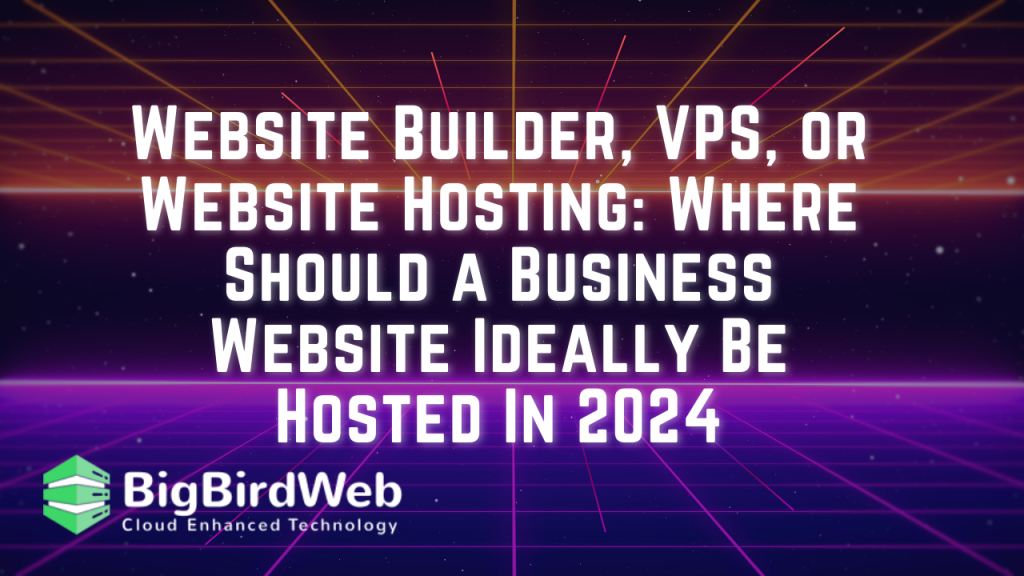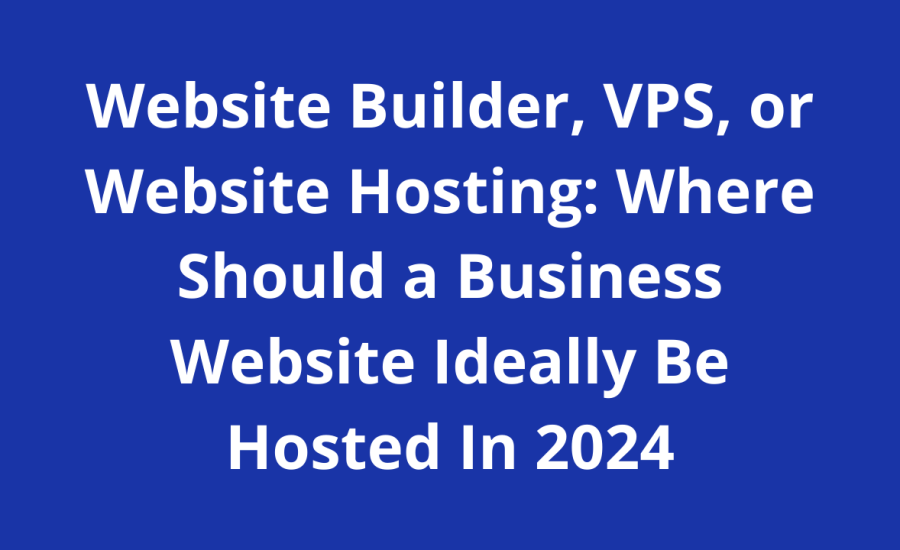Website Builder platforms, Virtual Private Servers (VPS), and traditional website hosting are three of the most popular options for hosting a business website. Each comes with its own set of advantages and potential drawbacks, making the decision a crucial one for any business looking to establish a strong online presence. In this blog, we’ll explore these options in detail to help you determine the best hosting solution for your business website.

Table of Contents
Understanding Website Builders
What is a Website Builder?
A website builder is a tool that allows users to create a website without needing to write code. These platforms provide a user-friendly interface, usually with drag-and-drop functionality, and a variety of templates to choose from. Examples include Wix, Squarespace, and Weebly.
Pros of Website Builders
- Ease of Use: Website builders are designed for users with little to no technical expertise. The intuitive interfaces and pre-designed templates make it easy to create a professional-looking website quickly.
- All-in-One Solution: These platforms often include hosting, domain registration, and various built-in features like SEO tools and e-commerce capabilities.
- Cost-Effective: For small businesses or startups, website builders offer a budget-friendly option with various pricing plans that include hosting and maintenance.
Cons of Website Builders
- Limited Customization: While website builders offer numerous templates, they can be restrictive in terms of customization compared to self-hosted solutions.
- Scalability Issues: As your business grows, you may find the features and performance of a website builder limiting.
- Dependence on Platform: Your website is tied to the platform, making it difficult to migrate to another host or service if needed.
Exploring VPS Hosting
What is VPS Hosting?
A Virtual Private Server (VPS) is a virtualized server that mimics a dedicated server environment within a shared hosting setup. VPS hosting provides more control and flexibility compared to shared hosting.
Pros of VPS Hosting
- Enhanced Performance: With dedicated resources such as CPU, RAM, and storage, VPS hosting offers better performance and reliability compared to shared hosting.
- Scalability: Affordable VPS hosting allows you to easily scale resources up or down based on your website’s needs.
- Customization: You have full control over the server environment, enabling you to install custom software and configure settings to meet specific requirements.
Cons of VPS Hosting
- Technical Knowledge Required: Managing a VPS requires a certain level of technical expertise, including server setup, maintenance, and security.
- Higher Costs: VPS hosting can be more expensive than shared hosting, especially if you need a managed VPS solution.
- Maintenance: You are responsible for maintaining the server, including updates, security patches, and backups.
Understanding Traditional Website Hosting
What is Website Hosting?
Website hosting involves storing your website files on a server and making them accessible via the Internet. This category includes shared hosting, dedicated hosting, and cloud hosting.
Pros of Traditional Website Hosting
- Variety of Options: Traditional hosting offers a wide range of solutions, from shared hosting (budget-friendly) to dedicated servers (high performance).
- Flexibility: Unlike website builders, traditional hosting allows for greater customization and flexibility in terms of software and configurations.
- Performance: With the right hosting plan, you can achieve high performance and reliability for your business website.
Cons of Traditional Website Hosting
- Technical Skills Needed: Like VPS hosting, traditional hosting often requires technical knowledge to manage and maintain the server.
- Variable Costs: Depending on the hosting plan and required resources, costs can vary significantly.
- No Built-in Features: Unlike website builders, traditional hosting doesn’t come with built-in website creation tools or templates, meaning you’ll need to build your site from scratch or hire a developer.
Comparing Website Builder, VPS, and Website Hosting
Ease of Use
- Website Builder: Ideal for beginners with no technical skills. Drag-and-drop interfaces and templates make it straightforward.
- VPS Hosting: Requires more technical expertise. Best for users comfortable with server management.
- Traditional Hosting: Varies widely. Shared hosting is relatively easy, while dedicated hosting requires significant technical knowledge.
Performance and Reliability
- Website Builder: Generally reliable but may struggle with high traffic volumes.
- VPS Hosting: Offers excellent performance and reliability with dedicated resources.
- Traditional Hosting: Performance depends on the plan. Dedicated hosting offers the best performance, while shared hosting may be less reliable.
Customization and Control
- Website Builder: Limited customization options. Best for simple websites.
- VPS Hosting: High level of customization and control over the server environment.
- Traditional Hosting: Flexible and customizable, especially with dedicated or cloud hosting.
Cost
- Website Builder: Cost-effective for small to medium-sized businesses. Includes hosting and maintenance.
- VPS Hosting: More expensive, but provides better performance and scalability.
- Traditional Hosting: Wide range of pricing options. Shared hosting is budget-friendly, while dedicated hosting is more costly.
Scalability
- Website Builder: Limited scalability. Better suited for smaller websites.
- VPS Hosting: Highly scalable. Easily adjust resources as your website grows.
- Traditional Hosting: Scalability depends on the plan. Cloud hosting offers the best scalability.
Choosing the Right Option for Your Business
When deciding between a website builder, VPS hosting, or traditional website hosting, consider the following factors:
- Technical Expertise: If you lack technical skills, a website is the easiest option. For those comfortable with server management, VPS or traditional hosting offers more control and customization.
- Website Complexity: Simple websites with basic features can thrive on website. For complex sites with high traffic, VPS or dedicated hosting is more suitable.
- Budget: Evaluate your budget. Website offers an all-in-one solution at a lower cost, while VPS and traditional hosting provide more power and flexibility at a higher price. You can also opt for free web hosting.
- Future Growth: Consider your website’s future growth. VPS and traditional hosting provide better scalability for growing businesses.
FAQs
1. What is the main difference between a website builder and traditional hosting?
A website builder is an all-in-one platform that includes hosting and site-building tools with user-friendly interfaces. Traditional hosting provides the server space for your website, but you’ll need to build the site yourself or hire a developer.
2. Can I switch from a website builder to VPS hosting later?
Yes, you can switch from a website builder to VPS hosting. However, it may involve a significant effort to migrate your site, especially if the website uses proprietary templates and tools.
3. Is VPS hosting suitable for small businesses?
Affordable VPS hosting can be suitable for small businesses, especially those expecting growth or requiring better performance and customization than shared hosting or website builders can offer.
4. How do I know if I need a dedicated server?
You might need a dedicated server if your website experiences high traffic requires extensive resources, or needs high security and performance. It offers the most control and customization but comes at a higher cost.
Bonus Content: Optimizing Your Website for Better Performance
1. Use a Content Delivery Network (CDN)
A CDN distributes your website’s content across multiple servers globally, reducing load times and improving performance for users around the world. This is beneficial regardless of whether you use a website builder, VPS, or traditional hosting.
2. Optimize Images and Media
Large images and media files can slow down your website. Use image optimization tools and compress files to enhance load times and overall performance.
3. Implement Caching
Caching stores a version of your website in a user’s browser, reducing the need for repeated data fetching and speeding up page load times. Most hosting solutions, including website builders, offer caching options.
4. Regularly Update Software
Ensure your website’s software, plugins, and themes are regularly updated to the latest versions. This enhances security and performance, regardless of the hosting option you choose.
By carefully evaluating your needs and considering the pros and cons of website builders, VPS hosting, and traditional hosting, you can make an informed decision that best supports your business’s online presence. Stay informed about the latest trends and technologies to keep your website performing optimally.
